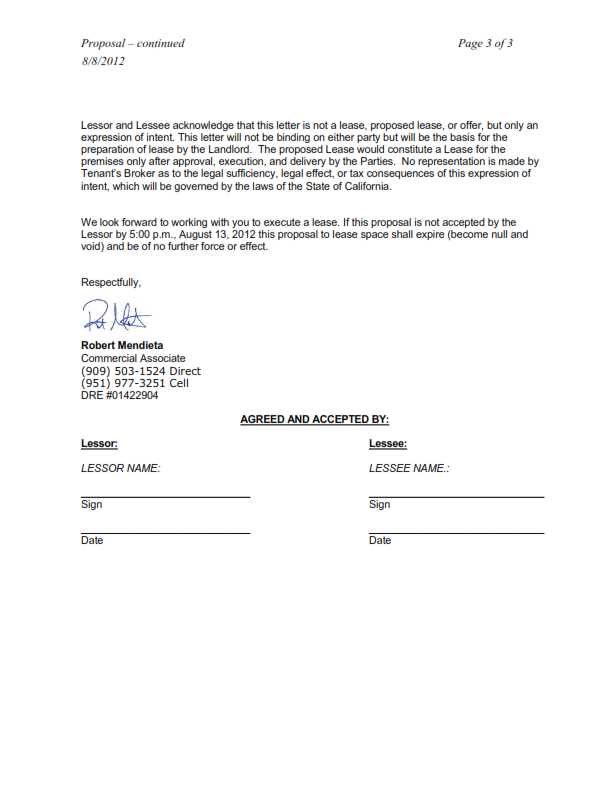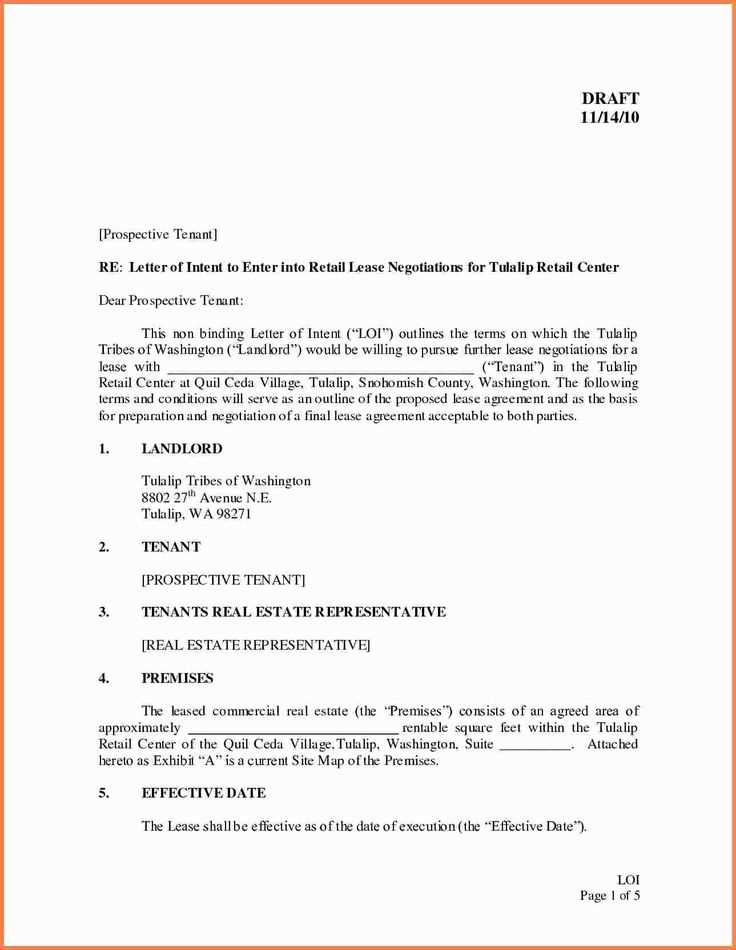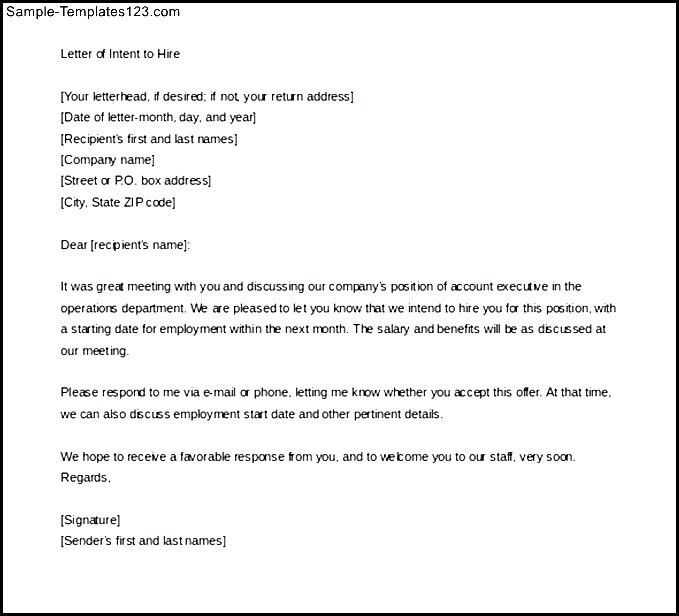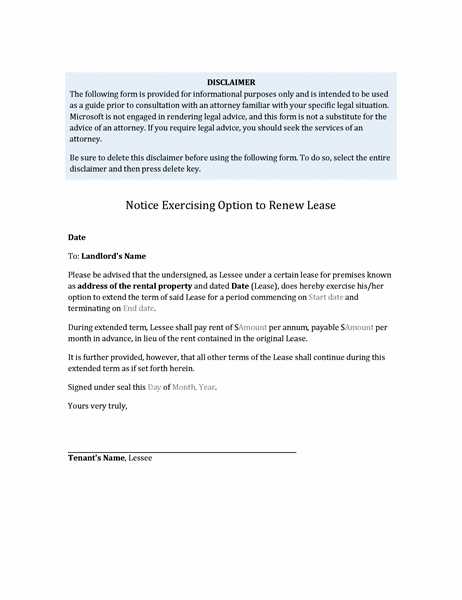Intent to renew lease letter template

Start your renewal request with a clear statement of your intent to continue the lease. Indicate your satisfaction with the property and your desire to extend the terms. Ensure your communication is professional yet personable, setting a positive tone for the renewal process.
State the specifics of the lease–mention the lease’s current expiration date and the duration for which you’re requesting the renewal. Provide any additional terms you wish to discuss, such as changes in rent or lease clauses, if applicable. Be direct but flexible in your approach to future terms.
Express appreciation for the landlord’s cooperation and the overall experience in the property. This fosters a cooperative relationship while demonstrating your commitment to maintaining a positive rental arrangement.
Finalize the letter by suggesting a meeting or further communication to discuss the renewal terms. Make it easy for the landlord to respond by providing contact details and expressing your availability for further discussions.
Intent to Renew Lease Letter Template
Begin your letter by addressing the landlord or property manager by name. Clearly state your intention to renew the lease agreement. For example, “I would like to formally express my intent to renew the lease for the property at [address] for another [length of time].” Include the specific date when your current lease expires and mention any terms you’d like to address or modify, such as rent adjustments or maintenance responsibilities.
Be sure to express your satisfaction with the property and the landlord’s management, showing that you want to continue the relationship. If you’re requesting changes to the lease, list them clearly and politely. For instance, “I would appreciate if we could discuss a slight adjustment to the rent rate for the next lease term, in line with current market trends.” Include any specific requests or clarifications related to the renewal process.
Close your letter with gratitude for the opportunity to continue your tenancy and a request for confirmation of the renewal. For example, “Please let me know if you require any further information or documents to proceed with the renewal.” Sign the letter with your name, contact information, and any other necessary details to ensure prompt communication.
Understanding the Purpose of a Lease Renewal Request
A lease renewal request is an official communication that indicates your intention to continue renting the property for another term. The purpose is to formally request an extension of the lease agreement before it expires, often to avoid misunderstandings or disruptions in occupancy. It helps both tenants and landlords clarify the terms for the upcoming lease period and ensures that both parties are on the same page regarding rent, responsibilities, and other conditions.
Why Renewing a Lease Is Beneficial
Renewing a lease can provide stability for tenants, eliminating the need to search for a new place to live. For landlords, it ensures continued rental income and minimizes vacancies. It’s also a way to keep the property occupied without the added expenses associated with tenant turnover, such as advertising, maintenance, or legal fees.
Key Elements of a Lease Renewal Request
A well-crafted request should include the tenant’s name, the address of the property, and a clear statement of intent to renew the lease. It should also mention the desired duration of the new lease term, any changes to rent or conditions, and a request for confirmation. This allows the landlord to consider the terms and respond appropriately, ensuring a smooth process for both parties.
Key Information to Include in Your Letter

Be clear and direct about your intent to renew the lease. Start by stating your intention clearly in the first paragraph. Mention the address of the property, your name, and the current lease expiration date. This ensures there is no ambiguity about which lease you are referring to.
Next, indicate the duration for which you wish to renew the lease. Whether it’s a one-year or longer extension, make this clear. If you’re requesting a change in terms, such as rent adjustments or any other modifications, include these details early on.
Provide the exact date on which you would like the renewal to take effect. This helps the landlord plan and ensures that there is no confusion about the start of the new lease term.
If you’ve had a good experience as a tenant, mention it briefly. This helps in establishing a positive tone and may encourage the landlord to grant the renewal without hesitation.
Finally, confirm your willingness to sign a new agreement upon acceptance. This demonstrates commitment and ensures the process moves smoothly.
| Information | Details |
|---|---|
| Tenant Name | Your full name |
| Property Address | Full address of the rented property |
| Lease Expiration Date | The current end date of your lease |
| Desired Lease Duration | Length of time you wish to extend the lease for |
| Effective Date | The date you want the renewal to begin |
| Commitment to Sign | Confirmation that you’re ready to sign the new lease agreement |
How to Address the Landlord or Property Manager
Begin your letter with a respectful salutation. Use the appropriate title followed by the landlord’s or property manager’s last name. If you are unsure about the title, “Dear [Name]” is acceptable, but it’s better to be formal.
- Use “Dear Mr. [Last Name]” or “Dear Ms. [Last Name]” for formal communication.
- If you know the property manager’s specific title, such as “Property Manager” or “Leasing Agent,” you can use that instead of a last name.
- If you do not know the name, a general greeting like “Dear [Property Name] Management” is appropriate.
Ensure that the greeting is polite and neutral. Keep the tone professional but approachable. This sets the right tone for the communication and shows respect for the person you are addressing.
Steps for Customizing the Template for Your Situation
Identify the key details of your lease renewal. Begin by replacing placeholders with specific dates, names, and addresses relevant to the lease. Make sure to update the rental amount, the term of the renewal, and any clauses that may be specific to your agreement.
Modify the tone to reflect your relationship with the landlord or tenant. If it’s a formal relationship, keep the language professional. If it’s a more casual one, feel free to adjust the tone accordingly while maintaining clarity.
Review any special requests or terms that need to be added to the renewal. Whether it’s a rent increase, maintenance expectations, or specific property modifications, include these in the relevant sections of the letter.
Check for any legal or state-specific requirements. Some regions may require certain information to be included or specific formatting, so adjust the template to meet those standards.
Personalize the closing statement to reflect your preferences. Whether you wish to express gratitude or outline expectations for further discussion, make sure it aligns with your intention for the renewal process.
Important Legal Considerations When Renewing a Lease

Review the terms of your current lease before entering renewal discussions. Ensure that both parties agree on any necessary changes, such as rent adjustments, duration, and responsibilities. Make sure the renewal aligns with your rights and obligations outlined in the original agreement.
Understand Rent Adjustments
Verify the lease’s rent escalation clause. Often, renewals include increases based on market rates or fixed percentages. Confirm the exact formula or cap for increases to avoid surprises later.
Confirm Lease Term and Conditions

Ensure the length of the renewed lease aligns with your plans. If your renewal offers a longer commitment, assess whether you’re willing to stay that long. Be clear on any conditions that might affect your ability to terminate the lease early.
Common Mistakes to Avoid in Your Renewal Letter
Be clear with the dates – Never leave the lease renewal dates unclear. Specify the start and end dates of the lease extension to avoid confusion. Ambiguity can lead to delays in the renewal process or misunderstandings with your landlord.
Check the terms – Ensure the terms of your current lease are referenced accurately. Mistakes in the rent amount, duration, or additional clauses may cause issues or delays in the renewal. Double-check everything before sending.
Avoid emotional language – Stick to the facts and avoid adding personal or emotional statements. Your renewal letter should be professional and focused on the logistics of the lease extension. Emotional language can reduce the impact of your message.
Don’t neglect the subject line – A vague or missing subject line can make it harder for your landlord to identify your intent. Be direct, such as “Lease Renewal Request for [Address].” This sets the tone for the content of your letter.
Be professional with tone – While you should be friendly, make sure your tone stays formal. This letter represents a legal agreement and should reflect professionalism. Avoid overly casual or overly formal language that may mislead the reader.
Don’t rush it – Take your time. Rushing through your letter can result in errors or missed details. Review it carefully before sending to ensure it meets all necessary requirements.